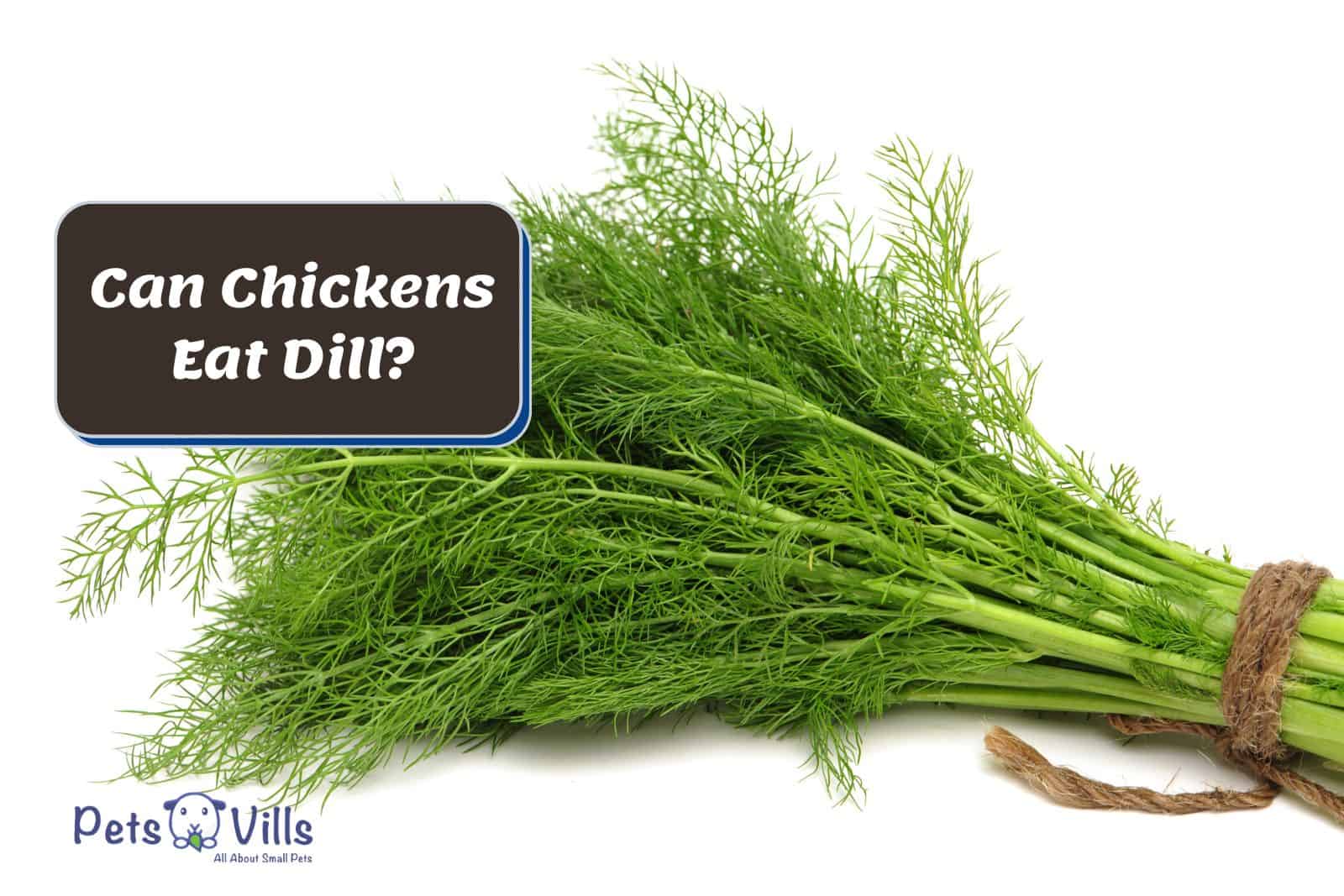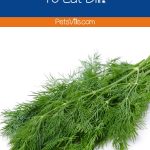Dill is an herb that’s easy to grow and popular as a flavor enhancer for food, medical treatment, and essential oil. As a result, I’ve often wondered if my chickens can use and eat dill.
So can chickens eat dill? According to experts, chickens can eat dill, including seeds and stems. It’s considered healthy for them as it’s low in calories and nutrient-rich (1).
But answering whether chickens can eat dill is a small part of the equation.
Read on, and you’ll soon learn if it’s an excellent addition to your chickens’ diet.
Table of Contents
Key Takeaways
- Dill is a perfectly safe herb for chickens to eat. It contains no toxins or other harmful components that could cause issues.
- Poultry owners can expect dill to offer their chickens several health benefits. Some include being a powerful antioxidant, promoting bone health, and strengthening their immune system.
- Even with the health benefits, moderation is necessary with dill. Serving dill to chickens a few times per week should be enough.
Is It Safe For Chickens To Eat Dill?
The first thing to understand about dill is it’s a herb. But unlike many other herbs, it contains no harmful toxins and is safe for your chickens to eat.
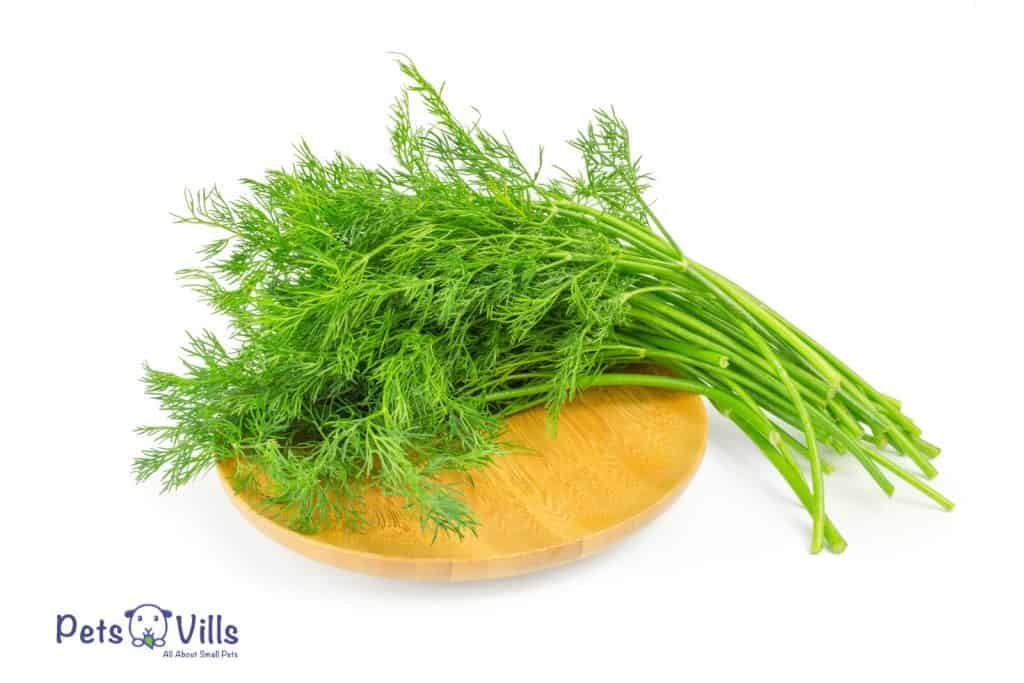
Instead, you can rely on dill to provide exceptional nutrition (2). I’ve found it’d to be an excellent supplement item to ensure my chickens’ diet meets their needs.
But poultry owners must be careful about how much dill to offer their chickens. It’s no secret that these birds are notorious for not knowing their limits.
So you must know it for them, especially with a herb like a dill. Therefore, moderation is key when feeding your chicken’s dill to avoid health issues like obesity.
Fresh dill can be helpful to use around the chicken coop. It’ll help hens be more productive while laying eggs, as it’s a natural sedative.
Health Benefits of Dill for Chickens
Since I’ve established dill to be safe, let’s consider how it could be beneficial. A great way to start this discussion is by outlining its health benefits for our beloved chickens.
So without further ado, here are some of its many health benefits:
#1 Rich in Antioxidants
Dill is known for being rich in antioxidants. But of course, many people don’t understand what antioxidants are, so let’s quickly define them.
Antioxidants are “man-made or natural substances that may prevent or delay some types of cell damage”(3). So you can expect them to help protect your chicken’s cells.
Due to this, your chicken eating a herb with high amounts of antioxidants is good. It’s why many poultry experts view dill as a serviceable and high-valued dietary item.
#2 Antibacterial properties.
One of the more unknown benefits is dill’s antibacterial properties. These abilities come from the essential oils inside the herb and help fight harmful bacteria.
I’ve also used dill to help prevent bacteria from spreading between my chickens. For instance, if one’s sick with a respiratory health issue, dill leaves can stop others from getting sick.
It’s a proven, effective preventative method within my chicken flock. I wouldn’t hesitate to recommend it to any poultry owner with a sick chicken.
#3 Bone Health
Dill contains high-valued minerals (calcium, magnesium, and phosphorus) that promote strong bones. So it’ll be crucial in keeping your chickens alive and healthy.
Otherwise, their bones will be brittle if they don’t get enough of these minerals. It could lead to structural issues or similar problems, such as broken bones.
So adding dill to a chicken’s diet can help avoid these issues. You can expect them to have strong, healthy bones that’ll hold up for a long time.
#4 Strengthens the Immune System
Initially, I was surprised to learn how much vitamin C is within this herb. But it contains a large amount to help your chicken’s immune system.
In other words, dill can help make it less likely they get sick. This benefit will sound like a winning one for every poultry owner.
But it doesn’t stop there. This high vitamin C amount will also help a sick chicken recover quicker, making it a valuable herb around the coop.
Looking to learn more about what chickens can eat? Check out our articles on “can chickens eat lavender“, “will chickens eat leeks“, and “can chickens eat sunflowers” for all the information you need to keep your feathered friends happy and healthy.
Can Chickens Eat Dill Seeds and Sprigs?
Chickens can eat dill seeds and sprigs as they don’t contain any toxins. So you won’t have to worry about any side effects from chickens ingesting these parts.
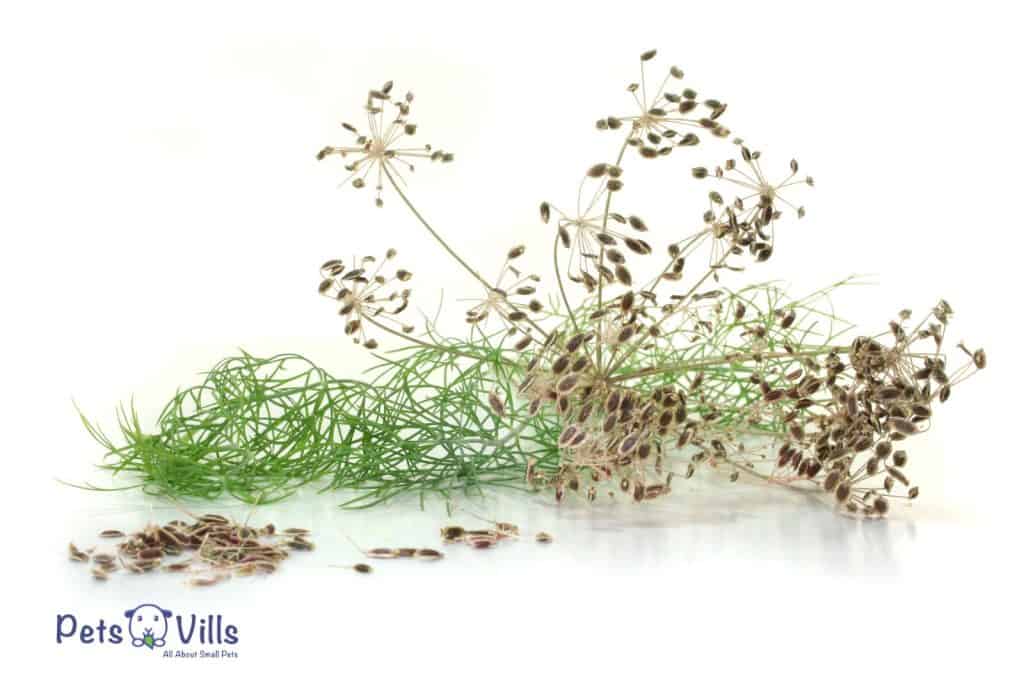
On the contrary, these parts are rich in antioxidants. They’re also a reliable source of calcium, iron, magnesium, manganese, phosphorous, and potassium sources.
Fresh or dried dill seeds/sprigs are acceptable if you want to serve them to chickens. The seeds are relatively effortless to use as I toss them to my chickens.
The chickens immediately start to peck and eat them without any reservations. If you want to be more sophisticated, sprinkling seeds on chicken feeds is another option.
As for the sprigs, if you want to feed them fresh, you’ll need to cut them into smaller pieces first. It’ll make it easier for them to eat and digest.
Drying the sprigs first is another way to feed the chickens. Once the dill sprigs are dried, sprinkle them over their feeds or treats.
How To Feed Dill To Chickens
Chickens will practically eat anything edible. When it comes to the dill plant, it’s the same, which provides you with several options.
But these four methods are my favorite choices when feeding dill to my chickens. So let’s see which one best suits your preferences as a poultry owner!
#1 Feeding Chickens Fresh Dill
The first way is using fresh dill. These fresh herbs are the best method to ensure your chickens get the most nutrition.
Dried or cooked dill can’t compare when it comes to nutritional value. So I’ll always recommend this option first whenever someone asks.
The actual serving process is easy, too. You start by cleaning and removing any debris/pests from the dill plants.
Once cleaned, it’s time to take out a trusty cutting instrument and dice it up finely. It’ll then be ready to be tossed into the coop or placed in your chicken feeder.
#2 Mixing Dill with Their Feeds
Some people like to mix dill into their chickens’ feeds. It’s a clever move as it’s a simple way to boost the feed’s nutrition level.
As for the actual process, you can either mix it using fresh or dried dill. But the dill plants must be cleaned thoroughly and cut into small pieces.
Once it’s prepared, you can then mix it into their feeds. Your chickens will then enjoy a healthy treat in their daily diet without even noticing.
#3 Feeding Chickens Dried Dill
Your next option would be dried dill, an excellent way to add nutrition. Dried dill is also convenient as it’ll last for years without losing its nutritional value.
Furthermore, serving dried dill to chickens is simple. All you need to do is sprinkle over their feeds or on their treats.
I prefer the former over using the latter, but both have proven very effective. It’s easy to see why so many poultry owners swear by using dried dill.
#4 Letting Chickens Eat From The Garden
One of the best methods is growing fresh dill in a garden. Then, when the dills have matured, you can let them in, and they’ll peck and eat it.
But you must be careful. Chickens are notorious for eating everything in their path without remorse.
They won’t hesitate to eat the dill plants from top to bottom. If you have other vegetables and herbs in the garden, the chickens will eat all of them.
There are a couple of methods you can try to prevent this outcome. The first one is to build a fence around the herb garden.
If you build a fence, ensure it’s low enough for the chickens to lean in and eat the dill. But it must also be high enough that they can’t get in without restriction.
Another method involves planting them in containers. This way, when the dill has matured, you can place it next to them, and they will eat it.
How Much Dill To Feed The Chickens
Since dill doesn’t have toxic components, many people may assume there isn’t a limit. But it’s not the case, as dill should only be used as treats for chickens.
In other words, dill plants don’t offer enough nutrition to be a staple food. It’s more of a supplement to provide a nutritional boost for chickens.
So a couple of times per week should be more than enough. If you stick to this guideline, it’ll offer all benefits for your chickens’ respiratory health and other benefits without issue.
Other Herbs That Chickens Can Eat
Dill isn’t the only safe, popular herb for chickens. I’ll talk about a few alternative options, so you have them if dill has yet to be a good fit with your chickens.
#1 Ginger
It shouldn’t be too shocking to see ginger on my list. I mean, it’s known as one of the healthiest spices available for humans (4).
This reputation extends to chickens with its antioxidant properties. Basically, ginger can help improve egg-laying performance.
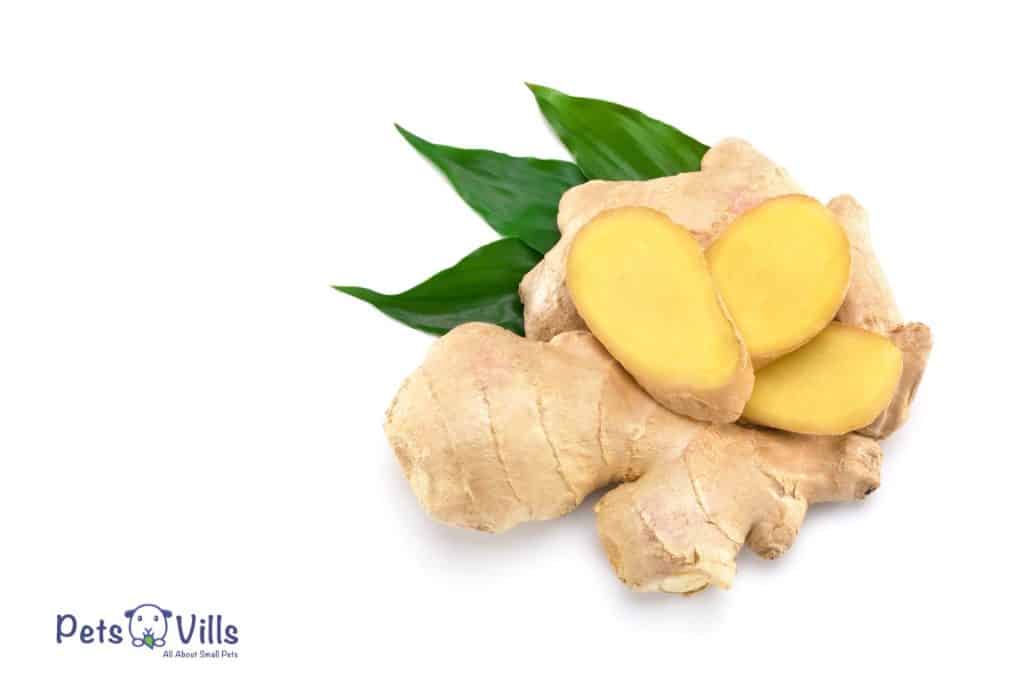
Due to this, the eggs will be much stronger, bigger, and taste better. Talk about a win, win, win for everyone involved.
Ginger is also known to help chickens with respiratory health issues. In addition, during the winter months, ginger can help prevent colds and other illnesses.
#2 Lavender
Lavender is known for its antiseptic and anti-inflammatory properties. It’s also one of the best-smelling herbs, promotes relaxation, and offers better sleep for chickens.
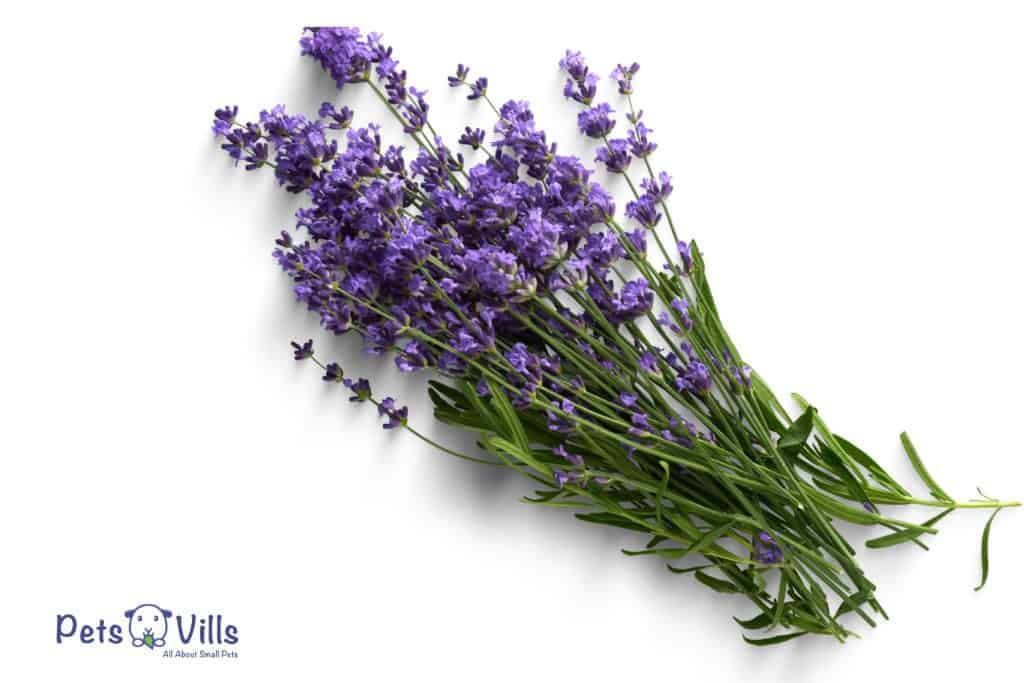
Additionally, I love placing lavender in and around the chicken coop. It’s a natural insect repellent that keeps all those annoying pests away from my flock.
FAQs
#1 Who should not eat dill leaves?
Among pets, bearded dragons are the ones who shouldn’t eat dill leaves. It’s much too acidic and causes them digestive issues.
#2 What are the side effects of dill?
Generally, dill is a safe plant, but it can cause allergic reactions, diarrhea, vomiting, and throat swelling.
Conclusion
So can chickens eat dill? Yes, it’s a safe herb meant to be a healthy treat to help supplement their regular diets.
But please, refrain from becoming too reliant on any dill treat. Sticking to a once or twice-per-week guideline is crucial to prevent overeating issues.
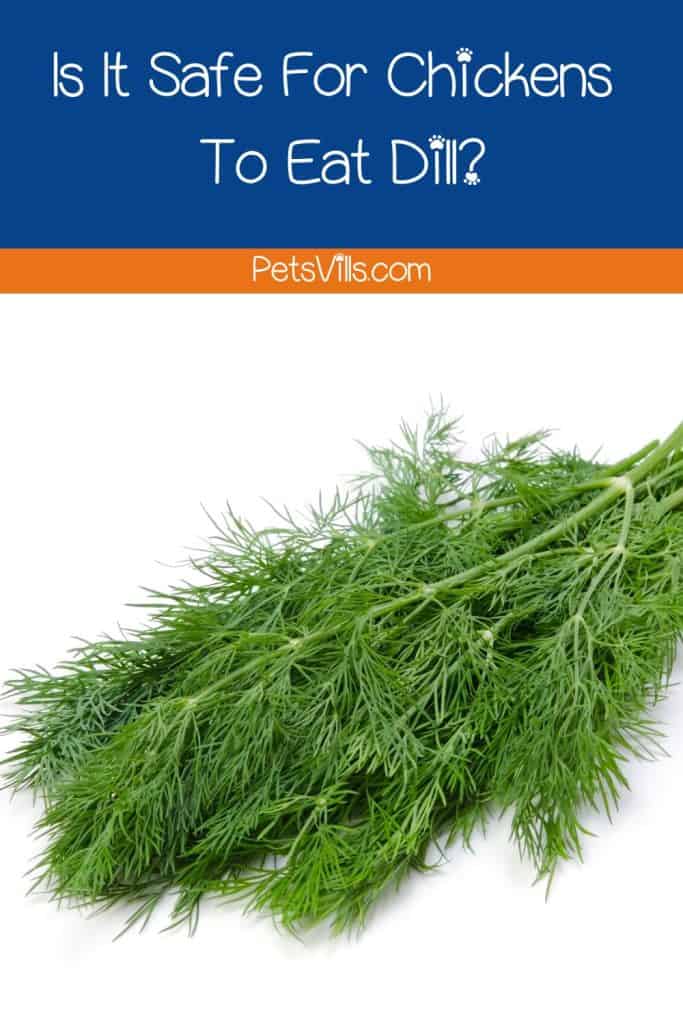
Resources
1. Torki M, Sedgh-Gooya S, Mohammadi H. Effects of adding essential oils of rosemary, dill and chicory extract to diets on performance, egg quality and some blood parameters of laying hens subjected to heat stress. Journal of Applied Animal Research. 2018;46:1118–26.
2. FoodData Central [Internet]. fdc.nal.usda.gov. Available from: https://fdc.nal.usda.gov/fdc-app.html#/food-details/172233/nutrients
3. National Center for Complementary and Integrative Health. Antioxidants: In Depth [Internet]. NCCIH. 2013. Available from: https://www.nccih.nih.gov/health/antioxidants-in-depth
4. Bode AM, Dong Z. The Amazing and Mighty Ginger [Internet]. Nih.gov. CRC Press/Taylor & Francis; 2011. Available from: https://www.ncbi.nlm.nih.gov/books/NBK92775/
Alina Hartley is a small-town girl with a ginormous love of bearded dragons. It all started with Winchester, a baby bearded who was abandoned at the shelter by his former owners because of a birth defect that caused one front leg to be shorter than the other. Alina originally went to the shelter looking for a guinea pig, but one look at Winchester and it was love at first sight. From that day on, Alina has dedicated her life to learning everything she can about bearded dragons. She loves helping new beardie parents start their incredible journey with these magnificent reptiles.
Follow her on:
LINKEDIN
TWITTER.
Read her latest articles HERE
Learn more about her HERE.

